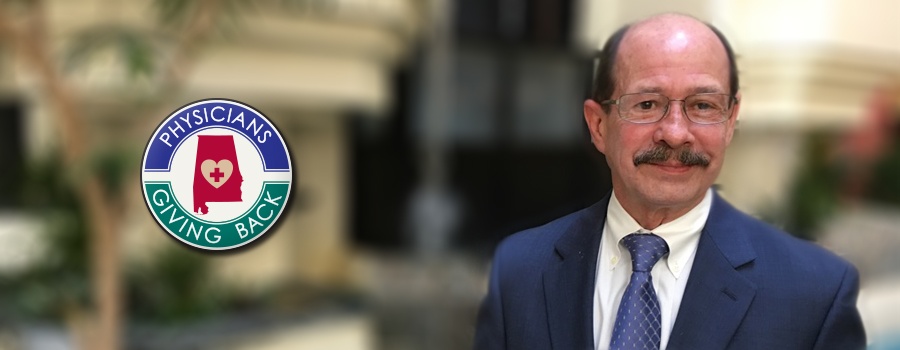MOBILE – You probably don’t know Lee Irvin, M.D., of Mobile, and he’s fine with that. He’s the kind of gentleman you’d love to hang out with and have a drink or dinner with…swap stories with. But it’s easy to see that his medical mission over the last couple of years wears heavy on his heart.
Dr. Irvin is a pain physician. Yes, a pain physician. He said he has no problem with introducing himself that way, even though there is a bit of a stigma associated with the treatment of pain, especially in Mobile following the arrest and conviction in February 2017 of Mobile physicians Xiulu Ruan and John Patrick Couch. Couch and Ruan were convicted in federal court for operating their clinics as pill mills, raking in millions of dollars by overprescribing potent, and deadly, narcotic pain medications to patients.
“It was like driving down the road, seeing a house on fire, and you’re the guy with a ladder,” Dr. Irvin said. “I was the guy with the ladder. Of course, I was going to help those patients.”
Dr. Irvin was the first physician in Mobile to treat patients with pain pumps more than 30 years ago, so he was the first physician to step up and render aid to the patients Couch and Ruan left behind who were on pain pumps. Dr. Irvin said he had about 35 of his own patients on pain pumps at that time, but there was an influx of nearly 350 pain pump patients from the now-closed practice in need of immediate care, some exhibiting signs of withdrawal by the time he intervened.
“Unfortunately, there were another reported 7,000 to 8,000 medication-managed patients from that practice that needed assistance,” Dr. Irvin said. “There was no way I could take on all of them, but in that year and a half, I took on another several hundred more. We were on a clock. It took almost a year to get those patients weaned off that medication. So, when you ask whether I had to do this, yeah…I did.”
One huge problem Dr. Irvin noted was the lack of resources for patients who have addiction issues, resources on the local and state levels that have left patients in need of specialized care falling through the proverbial cracks.
“We are in dire need of addiction specialists, social workers, mental health professionals – resources these patients need to get better. How can there be this tremendous need, yet we still do not have these resources to help our patients?” Dr. Irvin questioned.
Dr. Irvin continues to work closely with investigators with the Alabama Board of Medical Examiners to ensure the safety and health of the patients. As he puts it, “Doctors are supposed to help,” but he said he feels the reputation of most pain physicians has been tarnished by those who have put money above the welfare of their patients.
“When someone asks me now what my specialty is, I have no trouble saying I’m in pain management. I started in anesthesiology, but for the last 10 years or so, pain physicians have had such a bad reputation because of those bad physicians mistreating this profession and endangering the lives of their patients. We don’t want to write a bunch of narcotics to cover up an underlying disease. I have an old-fashioned idea that as a physician you should sit down with your patient and talk, get a complete history…and listen. It’s amazing how much information you can get from your patients if you just listen. I haven’t done anything amazing. I just listen and take care of my patients,” Dr. Irvin explained.
It may be an old-fashioned idea, according to Dr. Irvin, but his decision to make pain management his life’s work is actually deeply rooted in the illness of a family friend.
“I had a personal reason for specializing in pain,” Dr. Irvin said. “There was a fellow I grew up next door to who was like my second father. He was my hunting and fishing buddy. There were some kids out shooting while he was quail hunting, and he caught a .22 round in the hip. His doctors kept telling him it would do more harm than good to take that round out, but it was really a red herring. There was something else going on causing his pain.”
It was about 18 months later when Dr. Irvin’s old friend was told he had prostate cancer with mets. His pain wasn’t being managed very well, and one of the last times he visited with him, he had been warned that he might not recognize him…but he did.
“I wasn’t expecting that. He was in a lot of pain, sitting on a sack of medicine, and basically not knowing where he was, but he still recognized me. I couldn’t help but think there has got to be a better way. That was my moment. That was my reason for choosing pain medicine,” Dr. Irvin said.
